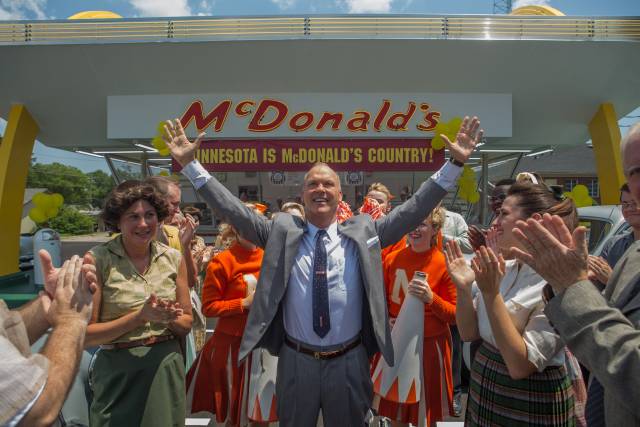
 Salesman Ray Kroc (Michael Keaton), dissatisfied with the dearth of prosperity in his milkshake maker business, decides to visit a small family diner in San Bernardino following a large order of his supplies from sibling owners Maurice “Mac” (John Carroll Lynch) and Richard “Dick” McDonald (Nick Offerman). Impressed by their restaurant, Kroc pays close attention as their “thirty years in the making” exposition is laid out on the table over dinner; their move from New Hampshire to California in pursuit of the Hollywood dream, a failed movie theater venture that coincided with the 1929 Crash and the journey from small time hot dogs to family value endorsed hamburgers.
Salesman Ray Kroc (Michael Keaton), dissatisfied with the dearth of prosperity in his milkshake maker business, decides to visit a small family diner in San Bernardino following a large order of his supplies from sibling owners Maurice “Mac” (John Carroll Lynch) and Richard “Dick” McDonald (Nick Offerman). Impressed by their restaurant, Kroc pays close attention as their “thirty years in the making” exposition is laid out on the table over dinner; their move from New Hampshire to California in pursuit of the Hollywood dream, a failed movie theater venture that coincided with the 1929 Crash and the journey from small time hot dogs to family value endorsed hamburgers.
Inspired by Mac and Dick’s shedding of unnecessary add-ons and poor sales menu items, their strict aesthetic, clone accoutrements and choreographed “symphony of efficiency” fast food preparation, Kroc tries to convince them into letting him franchise their McDonald's restaurant business. A painting in their office of the then barely realized Golden Arches pushes Kroc to inquire, “Who thought of that?” “That’s some pure Dick magic right there” says mild-mannered Mac of mild-mannered Dick - the ideas man. Likening Dick’s Golden Arches concept to the principles and patriotism of church crosses and US flags, Kroc eventually wins the brothers over before signing their fastidious contract.
But as Kroc talks his way in and shouts his way out of golf club business associations, his teething troubles grind their way into him mortgaging his home and being shunned by bank loans. Bourbon bottle focus-pulling and an increasing disinterest in his wife Ethel (Laura Dern) soon manifest. Reinvigorated by his attraction to powdered milk enthusiast Joan Smith (Linda Cardellini) and the crafty financial advice of Harry Sonneborn (B. J. Novak), Kroc cuts costs with cheap ingredients while shifting his focus from burgers to land-leasing real estate. As a result, his success soars at the expense of personal and professional ties.
Director John Lee Hancock unveils Kroc's sacrificial cow-cum-lukewarm product in shimmering scene-by-scene light, but The Founder is never overdone. Robert D. Siegel’s screenplay steers clear of cynicism while highlighting the fact that Ray Kroc's ruthlessness is closer to the indelible mark of the American Dream than the conscientious, tentative steps of Mac and Dick McDonald. Keaton emphasizes both the zeal and malignancy in Kroc’s relentless ambition with a rounded believability. The McDonald brothers' incredulity at his betrayal (“You put Dick’s arches on your letterhead?”), draws from the audience, a dual sense of empathy and inevitable requital. Kroc’s sales pitch tag, “McDonald's is family" isn't so imprecise, but home-cooked wholesomeness has no place but for momentary whimsy in a landscape that was never innocent or simple.